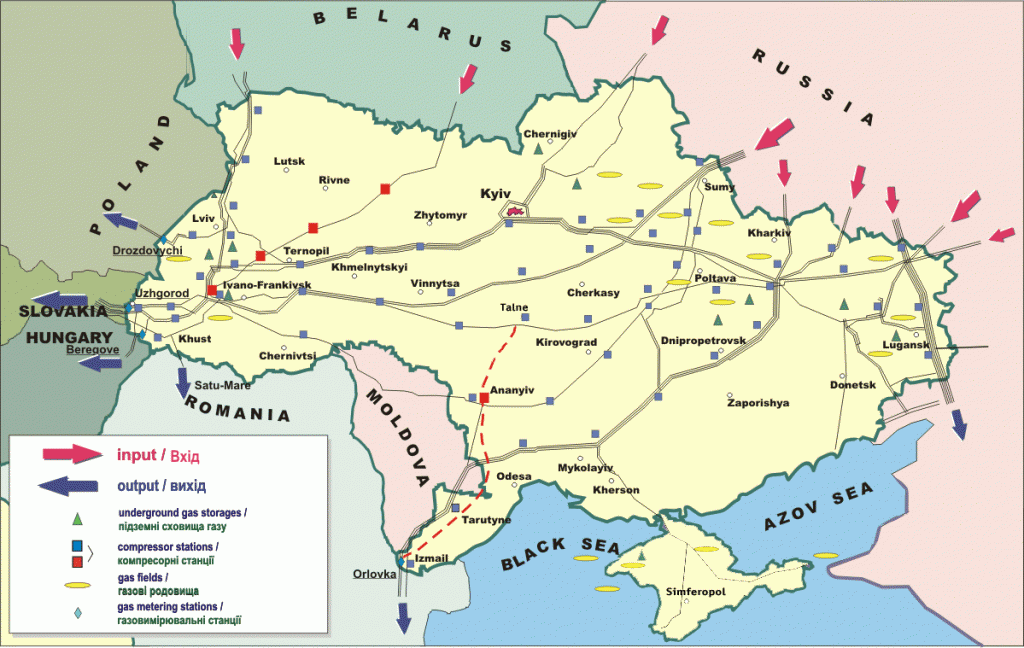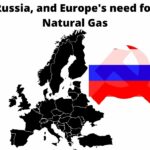On Monday, Vice President Joe Biden traveled to Ukraine to jumpstart plans frack that country. The aid package offered to Ukraine is $50 million split over several forms of assistance to restructure Ukraine’s government. Some of which is, of course, development of shale gas resources, or in other words fracking.
Readers of this blog will not be surprised, because I’ve covered this issue before. The US Government has decided that European Energy Security is a “national interest”, a phrase typically referring to interests over which we’re ready to go to War. Energy Security in this case means no dependence on Russia for natural gas supplies. US Government plans have been underway for years to develop, for Europe, a full array of alternatives to Russian natural gas. Fracking the shale deposits in Europe is one of those alternatives.
 |
| Natural gas pipelines through Ukraine |
Ukraine, because it possesses the pipelines through which Russian gas is sold to Europe, can play a critical role in freeing Europe from dependence on Russia. It’s not specifically because of the pipelines, but because Ukraine also has significant shale deposits. Those deposits, if fracked, could supply a significant quantity of natural gas outside Russia’s control. Oh, and it’s quite convenient that Ukraine has pipeline connections to the rest of Europe.
Because Ukraine is situation between Russia and the rest of Europe, because of the frackable shale deposits, and because of the pipelines, Ukraine is caught between a geopolitical power game between Russia, the EU, and the United States. It’s not just Ukraine, but every country that has frackable shale deposits. Romania is one such country.
With that in mind let’s see what the White House said about VP Biden’s trip to Ukraine. I’ve pasted the press release![]() below. It’s full of nice phrases, but let’s focus in on a few things.
below. It’s full of nice phrases, but let’s focus in on a few things.
U.S. technical experts will join with the European Bank for Reconstruction and Development and others in May to help Ukraine develop a public-private investment initiative to increase conventional gas production from existing fields to boost domestic energy supply. A technical team will also engage the government on measures that will help the Ukrainian government ensure swift and environmentally sustainable implementation of contracts signed in 2013 for shale gas development.
Department of Energy and USAID specialists will travel to Ukraine next month to provide advice on how to maximize energy efficiency, which could deliver potentially huge cost savings to Ukraine and rationalize energy consumption.
An office within USAID, the Unconventional Gas Technical Engagement Program, is charged with exporting Fracking technology to countries all around the world. UGTEP is part of USAID, which in turn is part of the US State Department, is part of USAID’s support of opening energy markets around the world to open competition. UGTEP’s purpose is explicitly about exploiting shale deposits around the world, and to do so requires fracking.
In other words, this is the United States making Fracking Ukraine so high a priority that it’s a key measure in the aid package offered during Ukraine’s crisis.
The phrase “Disaster Capitalism” comes to mind, referring to the pattern where some corporations focus on exploiting Disasters to further business interests.
As I’ve reported earlier, during 2013 two Western oil companies (Royal Dutch Shell, and Chevron) signed deals with Ukraine’s government to begin exploratory fracking in Ukraine. The deal with Chevron was signed in November 2013, just a couple weeks before Putin forced Ukraine into an about face that then caused the EuroMaidan protests, that then caused Yanukovych’s ouster, and the current situation where Russia is engaging in a slow motion invasion of Ukraine by infiltrating special forces operatives whose job is inspiring local uprisings.
I know of no way to prove this assertion – but it would appear Russian Pres. Putin saw these events unfolding, and decided he couldn’t let that stand. Putin’s over-arching goal is to recreate the Soviet Union, and he’s recently been using the phrase “Novorossiya” which means “New Russia”. On the one hand it refers to the area that’s now southern Ukraine, stretching all the way to Odessa, that Russia once held. On the other hand, the phrase refers to reconquering the areas that were formerly part of the Soviet Bloc during the Cold War years.
FACT SHEET: U.S. Crisis Support Package for Ukraine
President Obama and Vice President Biden have made U.S. support for Ukraine an urgent priority as the Ukrainian government works to establish security and stability, pursue democratic elections and constitutional reform, revive its economy, and ensure government institutions are transparent and accountable to the Ukrainian people. Ukraine embarks on this reform path in the face of severe challenges to its sovereignty and territorial integrity, which we are working to address together with Ukraine and our partners in the international community. The United States is committed to ensuring that Ukrainians alone are able to determine their country’s future without intimidation or coercion from outside forces. To support Ukraine, we are today announcing a new package of assistance totaling $50 million to help Ukraine pursue political and economic reform and strengthen the partnership between the United States and Ukraine.Elections and Constitutional Reform: Constitutional reform and free and fair elections are keys to Ukraine’s democratic development. Assistance in this area is a down payment on the country’s democratic development. We stand ready to provide further assistance to the new government after elections.The United States is contributing an $11.4 million package to support the integrity of the May 25 elections. These funds are being used to advance democratic processes – not to support a particular candidate or electoral outcome. These efforts include voter education programs, transparent election administration, effective oversight of the election process, election security and a redress of infractions, and a diverse, balanced and policy-focused media environment.
The United States is contributing support and monitors to the OSCE’s election observation mission and other monitoring groups. U.S. funded programs will provide at least 250 long-term observers and over 1,700 short-term observers.
We are also sending additional experts to provide advice on issues such as constitutional checks and balances, local governance, public participation, and the establishment of an independent, transparent judicial system.
Economic Assistance: The United States has already signed a $1 billion loan guarantee to help Ukraine meet its financial obligations and protect vulnerable citizens from the impact of economic adjustments. We have also supported Ukraine’s work with the IMF to secure a loan program worth $14-$18 billion. As these U.S., IMF, and European funds begin to flow, we will have technical experts from the U.S. Treasury Department on the ground to help the Ukrainian government allocate them effectively to stabilize the economy and ensure all the regions benefit. Currently, there are three banking advisors in Kyiv and we will be deploying public debt management and macroeconomic advisors in the coming week. We are also committed to providing additional technical assistance in the areas of budget and tax administration.Energy Security: Over the coming weeks, expert teams from several U.S. government agencies will travel to the region to help Ukraine meet immediate and longer term energy needs.Today, a U.S. interagency expert team arrived in Kyiv to help Ukraine secure reverse flows of natural gas from its European neighbors. The team will continue on to Poland, Hungary, and Slovakia in the coming days to work on the details of these arrangements. Reverse flows of natural gas will provide Ukraine with additional immediate sources of energy.
U.S. technical experts will join with the European Bank for Reconstruction and Development and others in May to help Ukraine develop a public-private investment initiative to increase conventional gas production from existing fields to boost domestic energy supply. A technical team will also engage the government on measures that will help the Ukrainian government ensure swift and environmentally sustainable implementation of contracts signed in 2013 for shale gas development.
Department of Energy and USAID specialists will travel to Ukraine next month to provide advice on how to maximize energy efficiency, which could deliver potentially huge cost savings to Ukraine and rationalize energy consumption.Rule of Law and Anti-Corruption: The United States is committed to helping Ukraine break the cycle of corruption that acts as a tax on business, an impediment to economic growth, and a drain on public trust in government. Technical advisors from the Departments of State and Justice have already been advising the government on anti-corruption measures. Today we are expanding this assistance program with additional commitments.Attorney General Holder will co-host an international conference in London April 29-30 to help identify, trace, and recover proceeds of corruption stolen by the former regime. This is part of an ongoing effort, including work by an FBI investigative team on the ground in Kyiv to help the government of Ukraine recover assets stolen from the Ukrainian people.
The United States will provide advice and assistance to help modernize Ukraine’s government procurement in accordance with international standards, including the creation of a vetted anti-corruption unit. We will offer technical assistance to that vetted unit to help build a sustainable anti-corruption regime within Ukraine, as we have done with substantial results in other parts of the world.
Specialized teams of prosecutors and investigators will help the Ukrainian government with other forms of technical assistance to put in place the proper legal and regulatory framework to fight corruption. The teams will also serve as a resource to ensure follow-through and effective implementation.People-to-People Ties: To further strengthen ties between the people of Ukraine and the United States, we are announcing our intent to establish a new bilateral visa regime that will extend the standard validity of visas for businesspeople and tourists from 5 years to 10 years on a negotiated reciprocal basis.Security Assistance: In addition to the $50 million package, today we are announcing the provision of $8 million of non-lethal military assistance to allow the Ukrainian armed forces and State Border Guard Service to fulfill their core security missions. The additional supplies include:Explosive Ordnance Disposal equipment and handheld radios for Ukraine’s Armed Forces.
Engineering equipment, communications equipment, vehicles, and non-lethal individual tactical gear for Ukraine’s Border Guard Service.This is in addition to the $3 million of Meals Ready to Eat and nearly $7 million of health and welfare assistance the United States is already providing to Ukraine. The United States will continue to actively review requests for additional support as Ukraine’s government further modernizes its armed forces and deals with evolving threats.
- Highway design could decrease death and injury risk, if “we” chose smarter designs - March 28, 2015
- GM really did trademark “range anxiety”, only later to abandon that mark - March 25, 2015
- US Government releases new regulations on hydraulic fracturing, that some call “toothless” - March 20, 2015
- Tesla Motors magic pill to solve range anxiety doesn’t quite instill range confidence - March 19, 2015
- Update on Galena IL oil train – 21 cars involved, which were the supposedly safer CP1232 design - March 7, 2015
- Another oil bomb train – why are they shipping crude oil by train? – Symptoms of fossil fuel addiction - March 6, 2015
- Chevron relinquishes fracking in Romania, as part of broader pull-out from Eastern European fracking operations - February 22, 2015
- Answer anti- electric car articles with truth and pride – truth outshines all distortions - February 19, 2015
- Apple taking big risk on developing a car? Please, Apple, don’t go there! - February 16, 2015
- Toyota, Nissan, Honda working on Japanese fuel cell infrastructure for Japanese government - February 12, 2015












